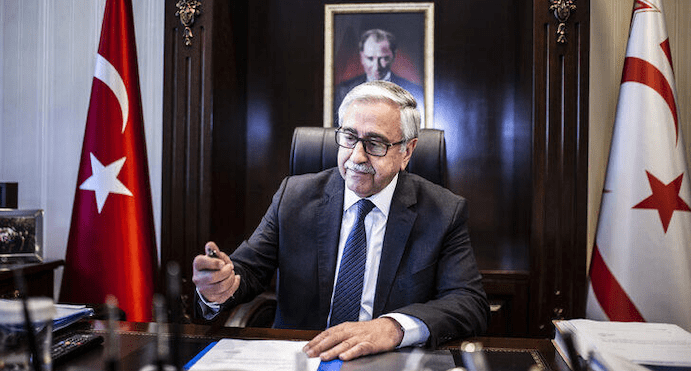Senior Turkish officials on Feb. 8 condemned the remarks by Mustafa Akıncı, the leader of Turkish Cyprus in a British daily.
The condemnations came after Akıncı talked to The Guardian about the long-standing reunification efforts in Cyprus island.
“If this failed to happen, he [Akıncı] said, the north [Turkish Cyprus] would grow increasingly dependent on Ankara and could end up being swallowed up, as a de facto Turkish province,” The Guardian cited Akıncı as saying.
Commenting on the possibility of a full-blown military takeover by Turkey, Akıncı was quoted by the newspaper as saying the prospect of a Crimea-style annexation would be “horrible.”
Turkey’s vice president Fuat Oktay said on Twitter: “I condemn the remarks that target Republic of Turkey which stands with TRNC [Turkish Cyprus] in all conditions and protect its rights and interests.”
It will not be tolerated to use Turkey as “a tool of election campaign” with political approaches lack of vision, he stressed.
Altun said in a written statement that Akıncı does not deserve to sit on the chair of presidency, which had cost the lives of Turkish Cypriots and Turkish soldiers.
“Turkey has no designs on the soil of any country and it will not tolerate Turkish soil being made benefits available to anybody,” he warned.
Justice Minister Abdulhamit Gül criticized Akıncı’s remarks on Turkey, as well, which he said hurt the ancestors and martyrs.
“Ankara will continue to stand by Turkish Cypriot as it has done so far,” he said.
Turkey’s nationalist party urges Akıncı to resign
Turkey’s Nationalist Movement Party (MHP) leader urged the current president of the Turkish Republic of Northern Cyprus (TRNC) to resign over his remarks.
Referring to Tayfur Sökmen, the president of the then-Hatay Republic, who merged the province with Turkey in 1930 after a referendum, Akıncı said he would not be a second Sokmen.
Lambasting Akıncı’s remarks, Bahçeli said Turkish Cypriot leader’s fear of being “swallowed by Ankara” and “a second Tayfur Sökmen” reflects his shamelessness and animosity against Turkish government.
“It is apparent that Mustafa Akıncı does not deserve the position he has been holding,” Bahçeli said, and urged Akıncı to resign “immediately”.
Bahçeli’s remarks were criticized in a statement made by the Turkish Cypriot presidency.
Naming Bahçeli’s remarks “outdated,” Akıncı’s spokesperson Barış Burcu accused the MHP leader of “continuing to use a confrontational language.”
“Being a minority of the Greek administration or to be annexed to Turkey is not the goal of the Turkish Cypriots, as our president [Akıncı] clearly emphasizes,” Burcu said in the statement.
Akıncı should apologize, Çelik says
Meanwhile, Ömer Çelik, spokesman for Turkey’s ruling Justice and Development Party (AKP) said Akıncı should apologize for his disrespectful remarks about Turkey.
Turkish Cypriot premier Ersin Tatar joined Turkish officials in condemning Akıncı’s remarks.
“That Akıncı criticizes Turkey via claims not existing is a wrong behavior with the aim of winning the election,” he said in a written statement.
Tatar said Turkish Cypriots will punish Akıncı by not voting in favor of him in the presidential election slated for on April 26.
Tatar stressed that Turkish Cyprus and Turkey will always be in close and friendly cooperation to solve the Cyprus issue.
Akıncı behinds his remarks
Meanwhile Akıncı reiterated that he was behind his remarks in a written statement he made on Feb. 9.
Reminding that Turkish Cypriots never embraced the possibility of annexation [to Turkey], Akıncı said that this scenario is against both Turkish Cypriots’ and Turkey’s interests.
Akıncı repeated the demand and need for a comprehensive federal solution in Cyprus in the statement.
“As people who are secular and democratic, internalized the culture of tolerance and peace and adhered to Atatürk’s principles; Turkish Cypriots want to continue their struggle for a life in modern European values. This struggle should be respected, not attacked,” he said.
In 1974, following a coup aiming at annexation of Cyprus by Greece, Ankara had to intervene as a guarantor power. In 1983, the Turkish Cyprus was founded.
The decades since have seen several attempts to resolve the Cyprus dispute, all ending in failure. The latest, held with the participation of the guarantor countries — Turkey, Greece, and the U.K. — came to an end without any progress in 2017 in Switzerland.
Also, read:
Referendum-like vote in North Cyprus

